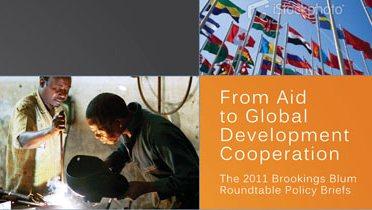The context for aid is changing. Globalization has spurred economic convergence, upending the 20th century economic balance and creating a smaller world where both problems and solutions spill across national borders more readily. This has given rise to a legion of new development actors—including emerging economies, nongovernmental organizations, private businesses and coordinating networks, who have brought fresh energy and resources to the field while rendering the prospect of genuine donor coordination ever more difficult. Global integration and the competition for resources have raised the prominence of global public goods, whose equitable and sustainable provision requires international collective action. Meanwhile, poor countries are demanding a new form of partnership with the international community, built upon the principles of country ownership and mutual accountability.
From the Group of Twenty (G-20) meetings and the upcoming Fourth High-Level Forum on Aid Effectiveness in Korea to unfolding events in the Middle East and North Africa, leadership from the United States is crucial, placing pressure on the Obama administration to deliver on its promise of farreaching reforms to U.S. global development efforts. And amidst this shifting global landscape remains the issue of how to effectively communicate the importance of global development cooperation to both national and global publics, at a time when budget pressures are being felt across many of the world’s major economies.
The following policy briefs explore these issues in detail, laying out the challenges and offering a range of specific recommendations on what needs to happen and why.
Read the brief below.
Reframing Development Cooperation » (PDF)
Laurence Chandy exposes some of the myths that surround development cooperation and endorses an effort to parse development activities according to a set of overarching objectives, which could then guide a more modern and useful aid taxonomy, as well as a better division of labor.
The G-20’s Development Agenda » (PDF)
Homi Kharas assesses the G-20’s standing as a body that can effectively tackle the development agenda, arguing for concrete actions in the focus areas of agriculture and infrastructure and for an elevation of the development work stream within the G-20 process.
The Road to Busan: Pursuing a New Consensus on Development Cooperation » (PDF)
J. Brian Atwood reflects on the recent evaluation of the Paris Declaration on Aid Effectiveness as he outlines essential goals for the Fourth High-Level Forum on Aid Effectiveness, which will take place in late November of 2011.
Daniel Kaufmann explores the importance of addressing misgovernance, corruption and political and economic capture by elites in Egypt, Tunisia and the broader region, and makes the case for better diagnostics and a redefined role for the international community in the Arab world.
The Shape of U.S. Global Development Reforms » (PDF)
Noam Unger offers specific recommendations to the Obama administration on the first anniversary of its announced global development policy after highlighting those reforms that are well under way, those that are not and those that are still missing from the agenda at this critical moment.
Preserving American Public Support for Foreign Aid » (PDF)
Steven Kull confronts the dire budget environment for U.S. foreign aid by putting forward a set of communication proposals that draw upon public opinion data and strategies that have been used to counter pressure for aid cuts in the past.
These policy briefs were commissioned for the eighth annual Brookings Blum Roundtable, held in Aspen, Colorado on August 3–5, 2011. The Roundtable convenes government officials, academics, development practitioners and leaders from businesses, foundations and international organizations to consider new ways to alleviate global poverty through cross-sector collaboration.
The Brookings Institution is committed to quality, independence, and impact.
We are supported by a diverse array of funders. In line with our values and policies, each Brookings publication represents the sole views of its author(s).



